Publications
For submission of articles or Working Papers to CEsA, please send an email to:
comunicacao@cesa.iseg.ulisboa.pt
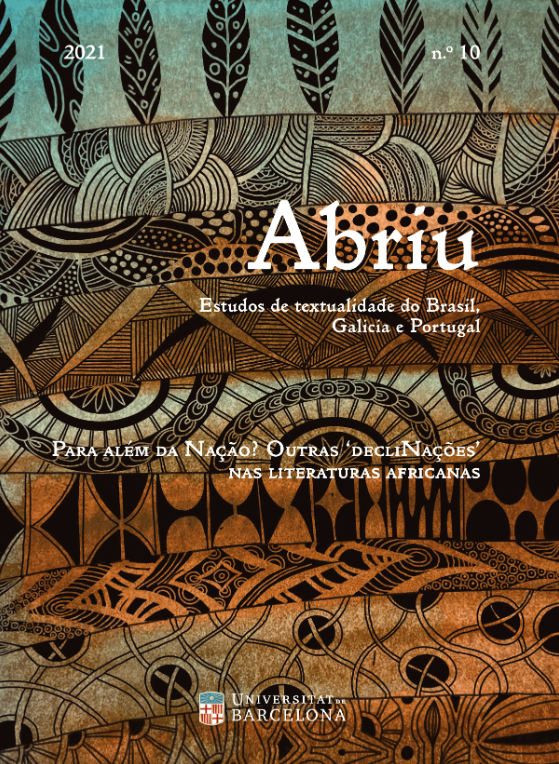
Beyond Nationhood: Other ‘Declensions’ in African Literatures
Abstract:
In the last two decades, Portuguese-speaking African literature, as a field of critical inquiry and object of academic study,1 has been undergoing a great expansion, with numerous dissertations, monographs, conference proceedings, special issues of journals, and articles produced in several countries. The article Beyond Nationhood: Other ‘Declensions’ in African Literatures traces the evolution of the national perspective in the studies of Lusophone African Literatures from the 1980s to the present. Based on a selection of collective and individual publications, as well as highlighting impor tant academic events for the area, the article seeks to identify lines of continuity and moments of rupture in the approach of these literatures based on the idea of Nation as a critical category and unity of analysis, from the consolidation of the link between literature and national independence affirmed after decolonization until the reception of post-colonial theories which occurred in the mid-1990s. Also, the article looks at the theoretical and disciplinary articulations between African Literature, Postcolonial Studies, Indian Ocean Studies and Comparative Litera tures, to provide a possible mapping of the most recent approaches that seek to build new critical cartographies for the studies of these literatures.
Quotation:
Falconi, J. (2021). Beyond Nationhood: Other ‘Declensions’ in African Literatures. Abriu: Estudos De Textualidade Do Brasil, Galicia E Portugal, (10), 9–38. https://doi.org/10.1344/abriu2021.10.1

Literatura colonial de autoria feminina: O Último Batuque, de Maria do Céu Coelho
Abstract:
Portuguese colonial literature written by women has received little attention in Lusophone literary and cultural studies. The most relevant exception, in this regard, is the case of Maria Archer, author of a significant number of fiction and non-fiction texts of colonial setting and theme that have received diverse readings and analyses. In particular, Ferreira’s works on women’s authorship writing and the connections between gender, nation and empire were pioneers in approaching this production according to an integrated theoretical framework, capable of illuminating material and symbolic transits and identity reverberations between nation and empire, in line with the paradigms of colonial and feminist historiography of the 1990s. Literatura colonial de autoria feminina: O Último Batuque, de Maria do Céu Coelho, aims to deepen and broaden the knowledge of Portuguese women’s writing on colonial themes, by providing a reading of the book O último batuque (1963) by Maria do Céu Coelho, published in Mozambique in the early 1960s. It is a singular work, for focusing on the eminently masculine topic of hunting from a woman’s perspective, and also for being a hybrid book that combines memorialistic writing and short novellas about the rural universe of colonial Mozambique. The paper discusses some of the essential characteristics of Portuguese colonial literature, as it has been conceptualized by several authors in previous studies. Resorting also to the vast literature on the articulations between gender, empire, and colonialism, the article seeks to equate the author’s position in the corpus of colonial literature, as well as to reflect on how her literary writing articulates race and gender.
Quotation:
Falconi, Jessica (2021) “Literatura colonial de autoria feminina: O Último Batuque, de Maria do Céu Coelho,” Portuguese Cultural Studies: Vol. 7: Iss. 1, Article 4.
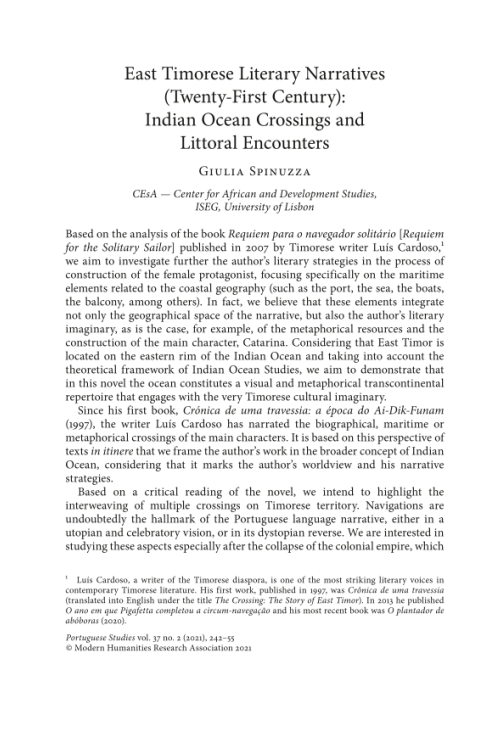
East Timorese Literary Narratives (Twenty-First Century): Indian Ocean Crossings and Littoral Encounters
Abstract:
The aim of East Timorese Literary Narratives (Twenty-First Century): Indian Ocean Crossings and Littoral Encounters is to analyze the book Requiem para o Navegador Solitário (2007) [Requiem for the Lonely Sailor] by Luís Cardoso considering the maritime elements that emerge in the novel and combining Indian Ocean Studies with Gender Studies. Pointing to the Timorese imaginary and the female protagonist’s perspective, we will focus on the elements related to the island’s coast, such as the shore, the sea, ships, sailors, and the interconnection with other islands and territories during the colonial period. In fact, we believe that these elements integrate not only the geographical space of the narrative, but also the literary imaginary, as is the case, for example, of the metaphorical resources and the construction of the main character, Catarina. Considering that East Timor is located at the eastern edge of the Indian Ocean and taking into account the theoretical theory of Indian Ocean Studics, we intend to demonstrate that in this novel the ocean constitutes a visual and metaphorical transcontinental repertoire that relates to the Timorese cultural imaginary itself. We will analyze the connection between the existential trajectory of Catarina, the novel’s female protagonist, the history of East Timor and the Indian Ocean crossings. This text, written in Portuguese by a Timorese author, portrays the complex history of this territory during World War II and offers a unique perspective on Timorese history.
Quotation:
Spinuzza, G. (2021). East Timorese Literary Narratives (Twenty-First Century): Indian Ocean Crossings and Littoral Encounters. Portuguese Studies 37(2), 242-255. doi:10.1353/port.2021.0017.

História de São Tomé e Príncipe: da descoberta a meados do século XIX
Abstract:
In História de São Tomé e Príncipe: da descoberta a meados do século XIX, the author explains how the Portuguese navigators arrived on the islands of São Tomé and Príncipe in the third quarter of the fifteenth century and transformed them into a social context for their development, but in which human and institutional relations were complex and even unbearable for the most disadvantaged, particularly on the island of São Tomé. Conflicts of all kinds worsened, particularly after the transition from a residential to a plantation society, with the intensification of the slave trade and the production and export of sugar. The long distance of the islands from the central power, located in Lisbon, constituted an ingredient that favoured the fomentation of conflicts in which the disrespect for the established rules was permanent and maintained during the period of domination of the native elite since the 17th century, marked around the main families that disputed access to power and control of wealth. The author shows that, despite its harshness, the colonial slave model had dynamics of social mobility that allowed some enslaved people to become free and others to become powerful in economic and political terms, even during the 16th century, becoming dominant until the mid-19th century.
Quotation:
Espírito Santo, A. (2021). História de São Tomé e Príncipe: da descoberta a meados do século XIX. Lisboa: Edições Colibri.
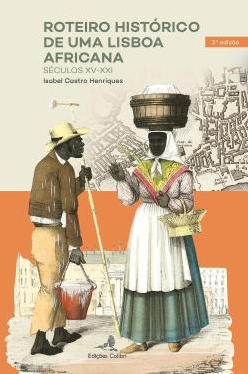
Historical Guide to an African Lisbon
Abstract:
Lisbon, a city of as many valleys and hills as there are myths surrounding its history and the people who invented it, stretches along the Tagus, where the river ends its course through Iberian land and plunges into the Atlantic Ocean. Lisbon was born on the hill of São Jorge Castle, where a Bronze Age settlement left its traces, which crossed with many other marks engraved by Greeks, Phoenicians, Lusitanians, Romans, Visigoths, Arabs, Jews and Christians. A long road of people and cultures, of stories and legends, of gods and heroes who, like Ulysses the mythical founder of the city – Olisipo – which owes its name to him, built and rebuilt this urban space. The aim of Historical Guide to an African Lisbon, XV-XXI Century is to show Lisbon’s Africanness, dispersed in a plurality of memories and immaterial and invisible traces in the days in which we live. History tells us about the settlement and life of thousands of Africans who for centuries took part in the process of building the Portuguese national fact. Travelling through the city, armed with historical knowledge, we are surprised by the vigorous African presence that invaded all spaces of Lisbon society, we reconstruct a hidden Lisbon, submerged by a centuries-old prejudice that still dominates our collective imagination and we understand, with greater clarity, not only behaviours, values, practices that remain in urban daily life, but also the constant reinventions of Portuguese and African identities, present in the country.
Quotation:
Castro Henriques, I. (2021). « Historical Guide to an African Lisbon, XV-XXI Century», versão revista e actualizada, Lisboa, Edições Colibri, 2021.
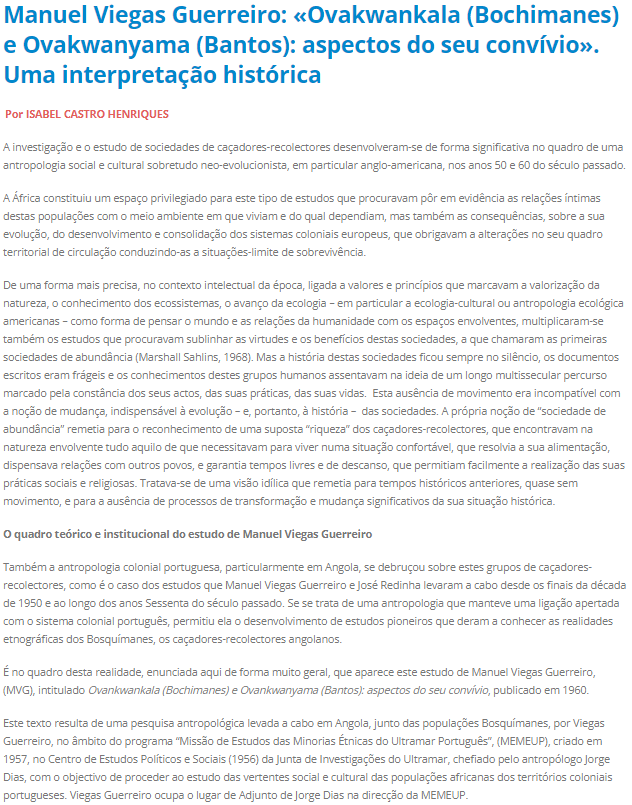
Manuel Viegas Guerreiro: «Ovakwankala (Bochimanes) e Ovakwanyama (Bantos): aspectos do seu convívio». Uma interpretação histórica.
Abstract:
The research and study of hunter-gatherer societies developed significantly within the framework of a mainly neo-evolutionist social and cultural anthropology, particularly Anglo-American, in the 1950s and 1960s. Africa constituted a privileged space for this type of study which sought to highlight the intimate relations of these populations with the environment in which they lived and on which they depended, but also the consequences, on their evolution, of the development and consolidation of the European colonial systems, which forced changes in their territorial framework of circulation, leading them to situations at the limits of survival. In a more precise manner, in the intellectual context of the time, linked to values and principles which marked the valorisation of nature, knowledge of ecosystems, the advance of ecology – in particular American cultural-ecology or ecological anthropology – as a way of thinking about the world and humanity’s relations with the surrounding spaces, there was also a multiplication of studies seeking to underline the virtues and benefits of these societies, which were called the first societies of abundance (Marshall Sahlins, 1968). But the history of these societies always remained silent, the written documents were fragile and knowledge of these human groups was based on the idea of a long, multi-secular path marked by the constancy of their acts, their practices and their lives. This absence of movement was incompatible with the notion of change, which is indispensable to the evolution – and therefore the history – of societies. The very notion of “society of abundance” referred to the recognition of a supposed “wealth” of hunter-gatherers, who found in the surrounding nature everything they needed to live in a comfortable situation, which solved their food needs, dispensed with relations with other peoples, and guaranteed free time and rest, which easily allowed them to carry out their social and religious practices. This was an idyllic vision that referred back to previous historical times, almost without movement, and to the absence of significant transformation and change processes in their historical situation. In Manuel Viegas Guerreiro: «Ovakwankala (Bochimanes) e Ovakwanyama (Bantos): aspectos do seu convívio». Uma interpretação histórica. Isabel Castro Henriques comments on the homonymous study conducted by Manuel Viegas Guerreiro.
Quotation:
“Castro Henriques, I. (2021). «Manuel Viegas Guerreiro – Ovakwankala (Bochimanes) e Ovakwanyama (Bantos): aspectos do seu convívio. Uma interpretação histórica. Lisbon, Newsletter Fundação Manuel Viegas Guerreiro, no 27, julho-setembro 2021, pp. 10-16.”
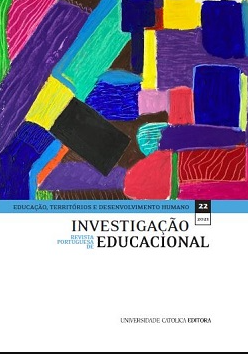
Sources and consequences of teachers’ stress during the Covid-19 pandemic
Abstract:
The covid-19 pandemic has had serious and unprecedented consequences on multiple facets of education. Teachers, students, schools and families have been affected, and the impacts of the pandemic will spill over into the future as well. The aim of Fontes e consequências do stress dos professores durante a pandemia da Covid-19 is to identify and explain the sources and consequences of teachers’ work-related stress and burnout during the pandemic, as well as their job and life satisfaction. Three sources of stress are considered: changes in organisation, content and amount of work; student behaviour and performance; and technostress. The empirical research is based on an original online survey applied to public school teachers (ISCED 2 and 3) in Portugal. Information is collected for four periods: before the pandemic; in the first school closure period in 2020 (16 March-16 September); in the second school closure period in 2021 (15 January-5 April); in the survey period (June-July 2021). The data collected include characteristics and changes about: teachers and their families; job satisfaction, stress and burnout; life satisfaction; working time and teaching duties; work-life balance; teaching goals, methods and outcomes; job stress; conditions for doing remote teaching; expectations for the 2021-22 school year. The results show that teachers’ work stress increased during the pandemic, with student behaviour and performance being a relevant explanatory factor. Difficulties in reconciling work and personal time are also predictors of teachers’ work stress. There are also signs of increasing burnout.
Quotation:
Pato, S., & Fontainha, E. (2021). Fontes e consequências do stress dos professores durante a pandemia da Covid-19. Revista Portuguesa De Investigação Educacional, (22), 1-17. https://doi.org/10.34632/investigacaoeducacional.2021.10467
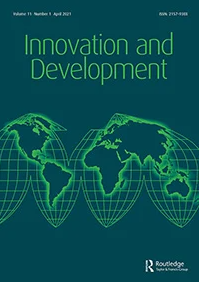
Innovation in development cooperation: emerging trajectories and implications for inclusive sustainable development in the 21st century
Abstract:
In the past twenty years, innovation has slowly, but steadily, become an important presence in development cooperation discourse and practice. The ambitious UN 2030 Sustainable Development Agenda has accelerated this trend, providing a strong framework for the main argument in favour of an innovation agenda for international development: without new ideas and innovative solutions, solving the current global development challenges will not be possible. Although this innovation-push is in line with a wider predominant view of innovation as an inherently positive force of progress, that alone does not explain when, how, and why innovation becomes a key topic in the field. This article seeks to fill this gap in the literature, providing an initial overview of innovation in development cooperation in the post-2000s. It argues, firstly, that innovation has always been part of international development policy and practice. Secondly, it links the recent strengthening of the innovation discourse to three trends in the systemic transformation of the field: the triumph of metrics-based agendas, the ICTs and digitalization revolutions, and the role of private sector actors. It concludes by critically assessing the implications of this narrative in changing the politics of innovation towards more inclusive sustainable development policies and practices.
Quotation:
Ana Luísa Silva (2021) Innovation in development cooperation: emerging trajectories and implications for inclusive sustainable development in the 21st century, Innovation and Development, 11:1, 151-171, DOI: 10.1080/2157930X.2020.1807100

Acerca da Repartição Funcional do Rendimento na Economia Portuguesa
Abstract:
The functional division of income – that is, the question of its primary distribution across the different factors of production and, in particular, between labour income (wages) and capital income (profits, interest and rents) – has been a major theme in political economy since its early days. Acerca da repartição funcional do rendimento na economia Portuguesa empirically analyses the evolution of the wage share in income in Portugal between 1960 and 2017, proposing a grid for interpreting the evolution of the functional distribution in the Portuguese economy characterised by the existence of different periods. Depending on the period in question, the empirical results reveal the existence of strong and significant associations between the evolution of the functional distribution and the real GDP growth rate, the inflation rate and the unemployment rate, respectively. These results suggest the succession over time of different regimes regulating the functional distribution of income in the Portuguese economy, which shift from countercyclical to procyclical over the period under review. The article is organised as follows: after this introduction, section 2 briefly discusses the interest of functional income distribution analysis and its linkages with some other debates in economic theory and analysis; section 3 outlines the evolution of the functional distribution of income in the Portuguese economy in the decades since 1960 and its main trends over time; section 4 carries out a set of bivariate, multivariate and structural stability analyses in order to contribute to a better understanding of the determinants of such evolution; and section 5 concludes.
Quotation:
Abreu, Alexandre; July 2020; 3) “Acerca da repartição funcional do rendimento na economia portuguesa”; Notas Económicas, no. 50; 8) pp. 85-101.
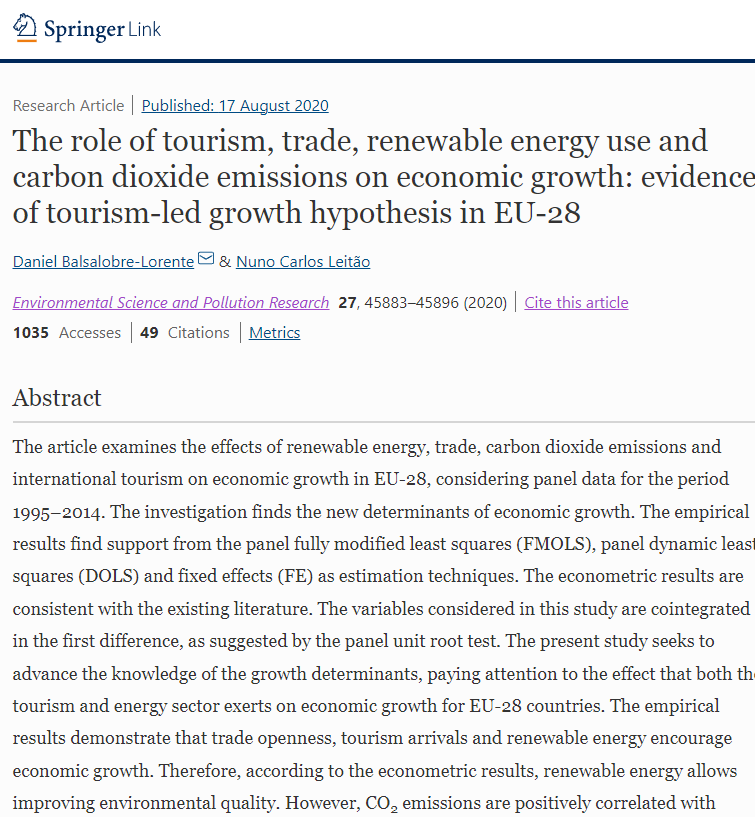
The role of tourism, trade, renewable energy use and carbon dioxide emissions on economic growth: evidence of tourism-led growth hypothesis in EU-28
Abstract:
The Role of Tourism, Trade, Renewable Energy Use and Carbon Dioxide Emissions on Economic Growth: Evidence of Tourism-Led Growth Hypothesis in EU-28 examines the effects of renewable energy, trade, carbon dioxide emissions and international tourism on economic growth in EU-28, considering panel data for the period 1995–2014. The investigation finds the new determinants of economic growth. The empirical results find support from the panel fully modified least squares (FMOLS), panel dynamic least squares (DOLS) and fixed effects (FE) as estimation techniques. The econometric results are consistent with the existing literature. The variables considered in this study are cointegrated in the first difference, as suggested by the panel unit root test. The present study seeks to advance the knowledge of the growth determinants, paying attention to the effect that both the tourism and energy sector exerts on economic growth for EU-28 countries. The empirical results demonstrate that trade openness, tourism arrivals and renewable energy encourage economic growth. Therefore, according to the econometric results, renewable energy allows improving environmental quality. However, CO2 emissions are positively correlated with economic growth, showing that growth is directly correlated by climate change and greenhouse gas. The results also confirm the tourism-led growth hypothesis (TLGH) for the panel. Finally, the empirical results confirm that trade openness, energy use and international tourism contribute to enhance economic growth. Based on these findings, further insights and policy prescription are offered in the concluding section.
Quotation:
“Balsalobre-Lorente, D., Leitão, N.C. (2020): The Role of Tourism, Trade, Renewable Energy Use and Carbon Dioxide Emissions on Economic Growth: Evidence of Tourism-Led Growth Hypothesis in EU-28. Environmental Science and Pollution Research. Publisher: Springer International Publishing”





